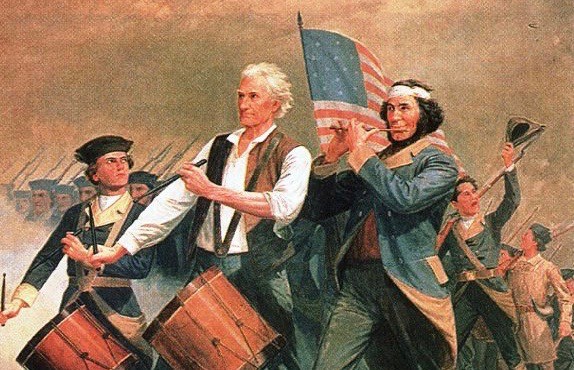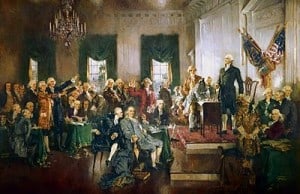Excerpt from “Obergefell v. Hodges: Eliminating Freedom in the Name of Upholding It“
Our founders, as well as many of our leaders and statesmen during our nation’s history, understood that devotion to God or “religion” was the only force that could hold both people and leaders accountable to the nation’s laws. Note that leaders, not just citizens, were to live under the law. Read carefully some of America’s statesmen’s words on the importance of religion in maintaining liberty.
- “Only a virtuous people are capable of freedom. As nations become corrupt and vicious, they have more need of masters.”—Benjamin Franklin (1706-1790)
- “[M]en…will be free no longer than while they remain virtuous.”—Samuel Adams (1722-1803)
- “Human rights can only be assured among a virtuous people. The general government…can never be in danger of degenerating into a monarchy, an oligarchy, an aristocracy, or any despotic or oppressive form so long as there is any virtue in the body of the people.”—George Washington (1732-1799)
- “Statesmen…may plan and speculate for Liberty, but it is Religion and Morality alone, which can establish the Principles upon which Freedom can securely stand….The only foundation of a free Constitution, is pure Virtue, and if this cannot be inspired into our People, in a great Measure, than they have it now, They may change their Rulers, and the forms of Government, but they will not obtain a lasting Liberty.”—John Adams (1735-1826) On October 11, 1798, Adams also said, “[W]e have no government armed with power capable of contending with human passions unbridled by morality and religion. Avarice, ambition, revenge, or gallantry, would break the strongest cords of our Constitution as a whale goes through a net. Our Constitution was made only for a moral and religious people. It is wholly inadequate to the government of any other.”
- “Bad men cannot make good citizens. It is impossible that a nation of infidels or idolaters should be a nation of free men. It is when a people forget God that tyrants forge their chains. A vitiated state of morals, a corrupted public conscience, are incompatible with freedom.”—Patrick Henry (1736-1799)
- “[W]ithout virtue there can be no liberty.”—Benjamin Rush (1746-1814), signer of the Declaration of Independence
- “We have staked the whole future of American civilization, not upon the power of government, far from it. We’ve staked the future of all our political institutions upon our capacity…to sustain ourselves according to the Ten Commandments of God.”—James Madison (1751-1836)
- “All societies of men must be governed in some way or other. The less they may have of stringent State Government, the more they must have of individual self-government. The less they rely on public law or physical force, the more they must rely on private moral restraint. Men, in a word, must necessarily be controlled, either by a power within them, or by a power without them; either by the Word of God, or by the strong arm of man; either by the Bible, or by the bayonet. It may do for other countries and other governments to talk about the State supporting religion. Here, under our own free institutions, it is Religion which must support the State.”—Robert Winthrop (1809-1894), to the Annual Meeting of the Massachusetts Bible Society Boston, Mass; May 28, 1849.
- “The life of the nation is secure only while the nation is honest, truthful and virtuous.”—Frederick Douglas (1818-1895)
- “America! America! / God mend thine every flaw, / Confirm thy soul in self-control, / Thy liberty in law!”—Katherine Lee Bates (1859-1929), in the second stanza of “America the Beautiful”
- “History fails to record a single precedent in which nations subject to moral decay have not passed into political and economic decline. There has been either a spiritual awakening to overcome the moral lapse, or a progressive deterioration leading to ultimate national disaster.”—Douglas MacArthur (1880-1964)
- “Without God, there could be no American form of government, nor an American way of life. Recognition of the Supreme Being is the first—the most basic—expression of Americanism.”—President Dwight Eisenhower, 1955 (1890-1969)
 “You cannot have liberty without faith. You may have tyranny and despotism without it, but not liberty. Because if you dissolve the bonds which faith creates, the government must inevitably move in to create the control which has been lost by [the removal of] the internal Christian self-government upon which the founders of this country based our nation.”—D. James Kennedy (1930-2007), in a sermon titled “The Bible and the Constitution” preached June 7, 1987
“You cannot have liberty without faith. You may have tyranny and despotism without it, but not liberty. Because if you dissolve the bonds which faith creates, the government must inevitably move in to create the control which has been lost by [the removal of] the internal Christian self-government upon which the founders of this country based our nation.”—D. James Kennedy (1930-2007), in a sermon titled “The Bible and the Constitution” preached June 7, 1987- “Does [Justice] Kennedy understand liberty apart from God’s moral code brings on horrors like were experienced during the French Revolution? Does he understand the role marriage and family play in self-governance? Does he have any idea of the kind of world he has insured our children will know?…America was morally adrift long before this ruling. This is the fast-track version of moral relativism as national political, legal, educational and cultural policy.”—Joseph Farah (b. 1954), founder, editor, and CEO of WND.com
This page is part of a larger article. Copyright © 2016 by B. Nathaniel Sullivan. All rights reserved.

